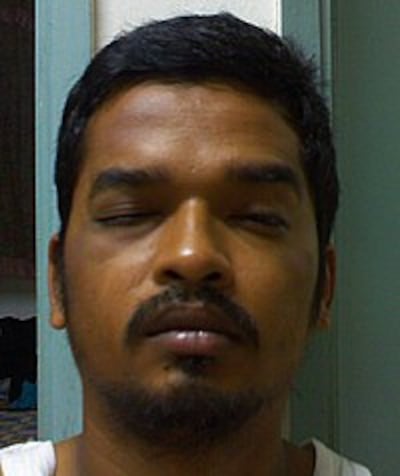BANGKOK—A leading advocate for Burmese migrant workers in Malaysia says he was kidnapped by Burmese-speaking men and held in brutal conditions for more than two weeks because of his outspoken criticism of human traffickers.
Ye Min Tun, secretary of the nongovernment Burmese Workers' Rights Protection Committee based in Kuala Lumpur, said a woman phoned him repeatedly late on Dec. 25 to say she had been injured at work and needed his help.
“She called again and again in the evening. A few minutes before we arrived at the hospital she called again and said, ‘I will be waiting outside the hospital—I will come and look for you,’” he said in an interview.
“I am very foolish. I shouldn’t have believed this.”
I regret that our own people would do this to me."
Ye Min Tun
Ye Min Tun, who served seven years in jail in Burma for opposing the government before fleeing to Malaysia a decade ago, said two colleagues escaped as several men seized, bound, and gagged him and drove to an unidentifiable area with huts and tents.
He was then repeatedly beaten, he said.
His captors spoke Burmese, he said, and he overheard one of them shouting at the others, saying he was angry because two witnesses had escaped.
“‘Why didn’t you kill them? Why did you let them go?’” Ye Min Tun quoted the man as saying.
Ransom demand

During the two weeks he was held, Ye Min Tun said, he overheard several people discussing him in Burmese, Malay, and Thai.
“I heard a man saying in Thai, ‘We are running a business, not working in politics, so I don’t want anything to come up that might harm our business.’ I understood them clearly.”
A colleague received a phone call on Jan. 7 from a roadside phone with an unidentified number, asking for 4,000 Malaysian ringgit (about U.S. $1,100), to obtain his release, Ye Min Tun said.
His colleagues handed over the money, in a transaction he declined to describe, and his captors released him, blindfolded and gagged, near his office in Kuala Lumpur late on Jan. 9, he said.
“They said to me, ‘You are disappointing to us—you are talking too much about the groups on the Malaysia-Thai border as human traffickers. We are not traffickers. We are helping people who want to get into Malaysia to work,’” he said.
“They beat and kicked me randomly, as in … movies. It was like someone was beating me for revenge,” he said.
Media reports about his disappearance increased pressure on his captors, who quarreled about his kidnapping, Ye Min Tun said.
“I am committed to this, to helping migrant workers in Malaysia. I regret that our own people would do this to me. I must be very careful in the future.”
Tens of thousands of Burmese
The UN High Commissioner for Refugees (UNHCR) cites the presence of more than 30,000 Burmese refugees in Malaysia. In 2006, it said 9,186 persons had active asylum cases pending in Malaysia, of whom 74 percent were Burmese.
Burmese migrant workers in Malaysia live at the mercy of international human-trafficking gangs who sell them back and forth as slave labor with the full knowledge of Malaysian and Thai immigration officials.
Thousands of Burmese find themselves stuck in a human rights no-man's-land after losing their legal status, often because employers withhold passports or refuse to pay their return airfare.
Reports of mistreatment and substandard living conditions within Malaysia's little-known immigration prisons are rife, as undocumented migrants are detained for indefinite periods.
Conditions in the detention centers have sparked protests, complaints to Malaysia's human rights body, riots, and breakouts.
Immigration officers often stage raids on suspected illegal immigrants using volunteer security forces who have wide-ranging powers, the right to bear arms, and little professional training.
Rights groups say children, pregnant women, and United Nations refugees awaiting resettlement to a third country have all been recently detained in such raids.
Human rights lawyers say that Malaysia's legal system lacks a clear distinction between illegal immigrants, refugees, and asylum seekers, and that immigration officers can imprison anyone without papers.
Original reporting by Kyaw Min Htun for RFA’s Burmese service. RFA Burmese service director: Nancy Shwe. Written and produced in English by Sarah Jackson-Han.
